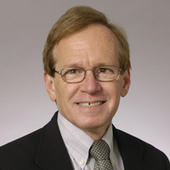UW–Madison economist Reschovsky to receive national honor
University of Wisconsin–Madison economist Andrew Reschovsky will be honored in November with the 2011 Steve Gold Award, which recognizes a person who has made a significant contribution to public financial management in the field of intergovernmental relations and state and local finance.

Reschovsky
The Association for Public Policy Analysis and Management, the National Conference of State Legislatures and the National Tax Association give the award each year in memory of Steve Gold, an active member of all three organizations whose career and life tragically were shortened by illness.
“I knew Steve Gold, which makes receiving this award even more meaningful,” says Reschovsky, a professor of public affairs and applied economics in UW–Madison’s La Follette School of Public Affairs. “As a public finance economist, Steve believed his role was to communicate to policymakers about research and analysis. His emphasis on the link between scholarship and practice and on policy-oriented work on public finance has very much influenced my career.”
Reschovsky focuses his research on tax policy and intergovernmental fiscal relations.
“The Steve Gold Award is a significant and very competitive award,” says La Follette School director Tom DeLeire. “The honor for Andy is well deserved, and we are pleased that his contributions to the field are receiving this recognition.”
Reschovsky’s current research and analysis includes a study of the impact of property taxes on the mobility of elderly homeowners, a study of the incidence of the property tax on homeowners, an analysis of the impact of the housing and economic crisis on the financing of the nation’s largest central cities, and a study of the financing of local public health departments in Wisconsin.
He advises the World Bank on a study of school financing in developing countries around the world and serves as a technical adviser to the Financial and Fiscal Commission in South Africa. Reschovsky is a visiting fellow at the Lincoln Institute of Land Policy, a think tank in Cambridge, Mass. His most recent papers have appeared in Regional Science and Urban Economics and in Public Finance and Management.
At the La Follette School, he teaches the Workshop in Public Affairs, in which students conduct policy analysis and research for real-world clients, including the city of Milwaukee, Wisconsin state agencies and international organizations. This fall he is teaching State and Local Government Finance.
He frequently shares his perspectives on state and national economics and public finance with national media, most recently the Los Angeles Times, the Wall Street Journal, Fox News and NPR.
Earlier recipients of the Steve Gold Award include Bob Lang, director of the Wisconsin Legislative Fiscal Bureau; George Zodrow, Rice University; Robert P. Strauss, Carnegie Mellon University; and Helen F. Ladd of Duke University.
Gold was an economist who passed away in 1996 at age 52. He served for six years as director of the Center for the Study of the States at the State University of New York in Albany, where he was also a professor of public administration and policy. Gold was known for his expertise on state and local taxes, budget deficits and financing.
Research shows Congress should move quickly on debt
The U.S. Congress should move quickly to adopt a framework for reducing the federal government debt, including plans for tax reform and dealing with the ballooning cost of entitlement programs, Reschovsky writes in the latest issue of the La Follette Policy Report.
The joint committee established this summer as part of the debt ceiling legislation should not limit its goal to a $1.5 trillion debt reduction mandated in the legislation, Reschovsky writes in a paper exploring the U.S. deficit and debt crisis, as well as the consequences of doing nothing to solve it.
“While the case for delaying the implementation of debt-reduction policies until the economy gets back on track seems strong, Congress should not delay the adoption of a framework for reducing the federal government debt.”
Reschovsky warns that while bringing spending in line with revenues is necessary for debt reduction, moving too rapidly would undermine the nation’s anemic recovery from the Great Recession.
“Failure to develop a plan now will reduce the confidence of the holders of our debt,” Reschovsky writes. “Our creditors will come to doubt that our leaders have the political will to make the hard decisions needed to solve our long-standing debt problem.”
While the U.S. has run a deficit in all but five years since 1960, the deficit grew to 10 percent of the national gross domestic product in fiscal year 2009 as the economy stalled and costs of federal programs to help people in need rose, he writes.
“Government efforts during the Bush and Obama administrations to prevent a complete collapse of the financial markets, to stimulate demand, and to bail out Fannie Mae and Freddie Mac all led to major surges in government spending,” Reschovsky writes in the paper. “As a result, the deficit skyrocketed.”
While Reschovsky expects a recovering economy will reduce the deficit to about 6 percent of GDP during the next decade, he projects it will increase again after that.
If current spending and taxation policies are maintained, total federal government revenue would be sufficient by 2025 to finance only the three major entitlement programs — Social Security, Medicare and Medicaid — and interest payments on the federal debt, Reschovsky says.
Financing all other government activities, from operating Congress to maintaining national defense and homeland security, would require borrowed money, he writes, estimating that by 2040, with debt interest growing rapidly, tax revenue would not even be sufficient to fund major entitlement programs.
“Only a balanced approach to solving our debt crisis, one that includes both spending cuts and increased taxes, is feasible,” Reschovsky writes. “That being said, neither spending cuts nor tax increases will be politically easy to enact.”




